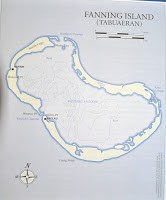Fanning Island is an atoll about midway between Hawaii and Tahiti with a population of a couple of thousand. Its highest point is around ten feet. Once upon a time it may have had strategic value as a cable relay station, but those years are ancient history now. The people who live on Fanning, in the island nation of Kiribati, are impoverished. They have no running water, no electricity, no roads and no other nearby islands with which to engage in routine intercourse. We know about Fanning Island because we stopped there for a day. There is nothing quite like dumping a thousand tourists into a place like that for a day. Thankfully we came and left in waves of several hundred each. The ship we sailed on is the only passenger liner that stops there, and it does so three or four times a year. For a few years a Norwegian liner called each week, but that did not last long. Inter-island freighters also stop by from time to time to make a delivery or perhaps pick up some copra.
Friends have asked us, what do they live on? Mostly it’s fruit such as coconut, mango, papaya, and banana; fish from the lagoon; pork from the pigs that every family raises and feral chickens. Schooling of some kind is offered through secondary levels. A local clinic is staffed by a nurse, supplemented by visiting ship’s doctors. Yes, our friends say, but what do they do for a living, how do they earn money? Since there is only one store with not much to sell, earning money to buy things is not something that must have a high priority. However, they do make money from cruise tourists who buy trinkets and make donations to groups of singers, dancers and cute little kids strategically placed along the most common pathways. That money goes to pay for fuel for the island’s half dozen vehicles, two or three small portable generators used to power things that need power on the occasions they need to be used, and a few western goods as well as the makings for trinkets they will sell to the next batch of tourists. A well paid government bureaucrat assigned to the island might make $4.50 a day and be one of the richest men in the place. Otherwise most money is pooled by clan or village.
What keeps them from living in what we know as abject poverty is isolation. If they lived in the midst of an urbanized society, they would be in abject poverty. As it is, they are poor but not needy. Life on Fanning cannot be romanticized. It is not a tropical Eden, but each family does have a home to live in. Food, though simple, is adequate, even abundant at times. Clothing brought in by missionary groups is enough for an equatorial climate. Water can be a problem since it depends on rain, but it does rain. The biggest threat is global warming that may submerge Fanning Island in decades to come.
So what are they missing? Well, health care could be improved. Other than that they seem to be missing television, traffic jams, road rage, Holiday spending binges, martinis, smog, Facebook, etc. Do they have problems? Of course they do. They have teenagers who find ways to do what teenagers do no matter where they are. They are educated. They know there is a wider world out there, and no doubt want to see it. They see the rich tourists come and go, and no doubt would like to find that magic place where all that money and stuff exists for the taking. Just the same, it might do each of us some good to live on Fanning Island for a few months to learn what we don’t need, or even want, and to learn also a greater appreciation for what we have.


There is a quaint story about the town of Kiribati. It seems an early missionary who went there had a typewriter with a malfunctional 's' key. What he wanted to spell was Kiribash, but could not, so he spelled the \”sh\” sound, ingeniously, with a \”ti\”, as it is pronounced in English in the -tion words (nation, condition, etc.)! Dr B
Dr. B – Our lecturer pronounced the word as Kiribas – sounds like your quaint story might be a very real one that has not necessarily been handed down to the tourists:)